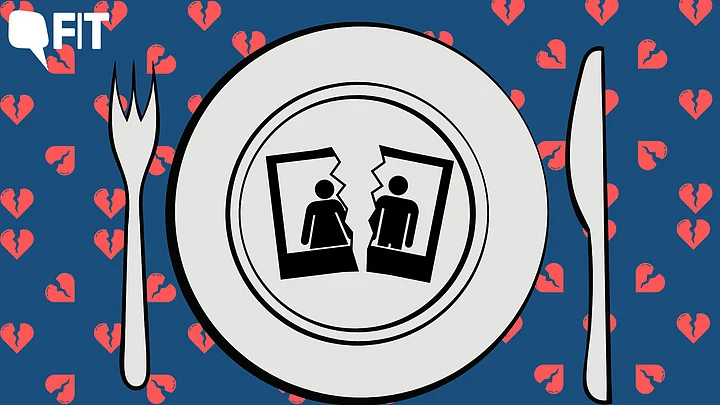Heartbreak and breakups can have a profound emotional and psychological impact on individuals.
When love takes an unexpected turn, it can leave a lasting impact on more than just our hearts. It can, in fact, significant changes in various aspects of life, including diet and eating habits.
The phenomenon known as the 'heartbreak diet' has captured the attention of many, as it reveals the intricate relationship between emotions and our dietary patterns.
This intriguing concept refers to the weight loss that often accompanies a breakup or divorce, and it's not just a figment of imagination.
"I was going through terrible heartbreak, I didn't even realise how deeply it had affected me till I noticed an undeniable shift in my physical appearance. I had lost 10 kgs within a month."Naval, 25.
This goes to show that when going through a heartbreak or breakup, it's extra important to pay attention to your health and diet.
The Broken Heart's 'Food Walk'
The journey of heartbreak begins with a surge of emotions that send ripples through our entire being. As grief sets in, our bodies respond in astonishing ways.
"When you're in love, the body and mind feel a level of contentment that is higher than usual, this is accompanied by an elevated release of the happiness hormones such as dopamine and oxytocin, says nutritionist Arnab Ghosh.
Ghosh tells FIT, "These make the body calm and help maintain a healthy appetite. But a heartbreak or a breakup causes distress which leads to the release of stress hormones like cortisol and epinephrine."
Eventually, it puts the body in a fight-or-flight state and typically results in a loss of appetite and regular metabolism.
Slowly but steadily, the numbers on the scale began to drop, and he found himself losing weight without even consciously trying.
"Shedding tears became a cathartic release, and as I navigated through the depths of my emotions, I discovered that my body was responding in ways I never imagined," says 33-year-old Janvi. "The emotional weight I carried was gradually reflected in my physical appearance," she adds.
Eating Your Feelings
"A healthy, well-balanced diet can help us think clearly and feel more alert. It can also improve concentration and attention span. Conversely, an inadequate diet can lead to impaired decision making and slow down reaction time."Esha Wadhwa, Senior Dietician, BLK Max Super Speciality Hospital.
"Food can also serve as a temporary source of comfort and solace during times of emotional distress," Wadhwa tells us.
Emotional eating involves using food as a coping mechanism to soothe negative emotions and alleviate emotional pain. It is often characterized by cravings for high-calorie, sugary, or fatty foods that provide immediate pleasure and comfort but may not be nutritionally beneficial.
"There is a tendency to eat less and when you do, you end up choosing simple carbs. We are hardwired to release dopamine and Oxytocin when we get simple sugar. It actually works like an addiction in some cases. Hence the classic rom com stereotype of a tub of ice cream after heartbreak."Arnab Ghosh, Nutritionist.
Feelings of sadness, apathy, or low self-esteem can contribute to a lack of motivation to prepare nutritious meals or make conscious food choices.
Mental Health And Its Correlation With Diet
"The correlation between mental health and diet during a heartbreak or breakup is significant. Emotional well-being plays a crucial role in our dietary choices and overall health," Arnab says.
Here's how mental health can impact your diet:
Emotional eating: Stress, sadness, and loneliness can trigger emotional eating, leading to the consumption of comfort foods that are often high in calories, sugar, and fat. Emotional eating can provide temporary relief but does not address the underlying emotional issues.
Lack of appetite: Some individuals may experience a loss of appetite due to emotional distress. Depression, anxiety, and grief can diminish the desire to eat, leading to inadequate nutrition and energy levels.
Nutritional imbalances: Emotional turmoil can lead to a disruption in the intake of essential nutrients. Depending on individual coping mechanisms, some may rely on unhealthy foods, while others may neglect proper nutrition altogether.
Impact on overall well-being: Poor diet choices and nutritional imbalances can further contribute to decreased energy levels, weakened immune function, and worsened mental health symptoms.
It's essential to prioritize self-care and nourish your body with wholesome foods to support both physical and mental well-being during this challenging time.
The Journey Towards Healing & Self Care
If you're struggling with your diet due to a breakup, here's some motivating advice for you:
Practice self-compassion: Remember that it's okay to feel emotions and have fluctuations in your eating patterns. Be kind to yourself and allow yourself to heal at your own pace.
Seek support: Reach out to friends, family, or a support group who can provide encouragement and understanding. Sharing your feelings and experiences can help alleviate the emotional burden and reduce the urge to rely on food for comfort.
Focus on nourishment: Rather than using food as a coping mechanism, prioritize nourishing your body with wholesome, nutrient-dense meals. Choose foods that provide a balance of carbohydrates, proteins, and healthy fats to support your physical and emotional well-being.
Engage in self-care activities: Find healthy alternatives to cope with emotional distress. Engage in activities that bring you joy, such as exercising, practicing mindfulness or meditation, journaling, or pursuing hobbies that make you feel good about yourself.
Seek professional help if needed: If you're finding it difficult to cope with the emotional impact of the breakup or your eating patterns are severely affected, consider seeking support from a therapist or counselor who can provide guidance and help you navigate through this challenging time.
Remember, it's crucial to prioritize self-care and seek professional help if you're struggling with your mental health or experiencing significant disruptions in your eating patterns.

